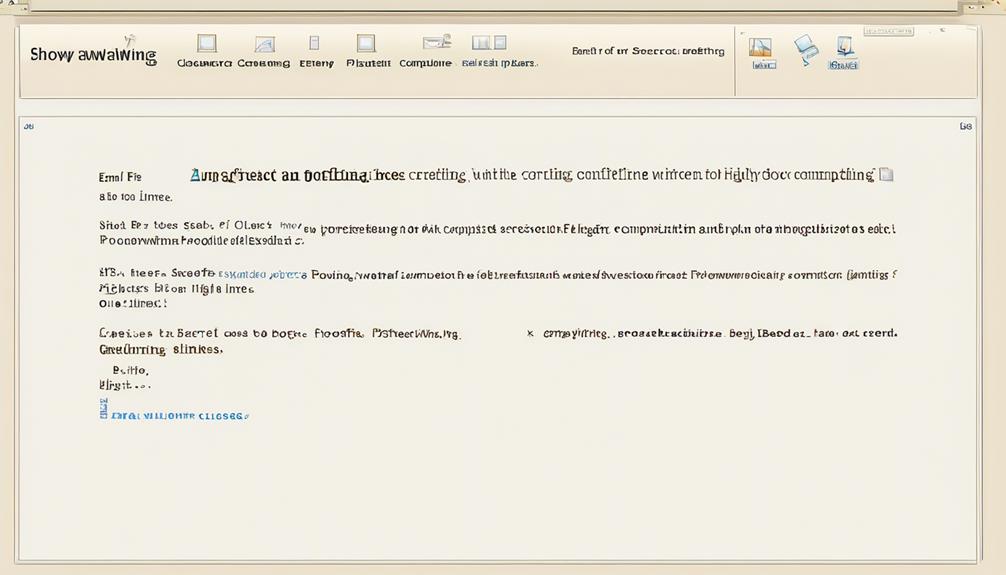So, you’ve made the decision to dive in and contact a professor regarding a research opportunity – a fantastic decision! However, the question remains: how do we compose an email that not only expresses our enthusiasm but also demonstrates our professionalism?
Well, let's start with the basics and work our way up to the finer details. Trust me, the approach we take can make all the difference in catching the professor's attention and setting the stage for a fruitful collaboration.
Key Takeaways
- Use a clear and specific subject line to indicate the purpose of the email.
- Maintain a professional and respectful tone throughout the email.
- Introduce yourself and provide context for the email, clearly stating the purpose in the opening paragraph.
- Express your enthusiasm and eagerness to collaborate, while demonstrating alignment with the professor's research interests.
Crafting a Professional Subject Line
When emailing a professor to inquire about research opportunities, it's crucial to craft a clear and specific subject line that succinctly conveys the purpose of the email.
A well-structured subject line is essential in capturing the professor's attention and conveying professionalism. It should clearly indicate the intention of the email, such as 'Inquiry About Research Opportunities in [Specific Field]' or 'Seeking Research Collaboration in [Specific Area]'.
By directly addressing the research opportunity or topic being inquired about, the subject line immediately informs the professor of the email's content, facilitating a prompt response. It's important to avoid vague or generic subject lines that could lead to the email being overlooked or categorized as spam.
Additionally, the subject line should maintain a professional and respectful tone, demonstrating courtesy and consideration for the recipient. By adhering to these guidelines, the email is more likely to be perceived as professional and serious, increasing the chances of a positive response from the professor regarding the research opportunities.
Addressing the Professor Appropriately

When addressing a professor, it's crucial to use a formal salutation and maintain a respectful tone throughout the email. By doing so, we convey our professionalism and seriousness about the research inquiry.
It's important to establish a level of respect and professionalism right from the start.
Proper Salutation
Address the recipient with a proper title, such as 'Dear Dr. [Last Name],' to demonstrate respect and professionalism when initiating communication with a professor for research purposes. When writing an email to a faculty member for a research request or to inquire about opportunities in their lab, the salutation sets the tone for your interaction. Here's an example of a proper salutation for an email to a professor:
| To: | Dr. Smith | From: | Your Name | Subject: | Research Opportunity Inquiry |
|---|---|---|---|---|---|
| Dear Dr. Smith, |
Using "Dear Dr. [Last Name]," is a courteous and appropriate way to begin your email, showing that you recognize and respect the professor's academic status. This sets a positive tone for the rest of your communication.
Formal Tone
Addressing the professor with the appropriate title of 'Dear Dr. [Last Name]' is crucial in maintaining a formal and respectful tone when initiating communication for research purposes.
When writing an email to faculty members expressing interest in undergraduate research opportunities, it's essential to use the correct title to show respect. Refrain from using casual language, abbreviations, or emoticons in your email to maintain a professional and respectful tone.
Additionally, it's important to conclude the email with a warm yet professional closing, such as 'Sincerely' or 'Best regards', to further demonstrate formality and respect.
Keeping the email concise and to the point while upholding a professional tone is key when reaching out to faculty members for research opportunities.
Introducing Yourself and Your Purpose
We are third-year students majoring in biology and are writing to express our keen interest in conducting research under your guidance. Our passion for the field of biology has led us to seek opportunities to gain hands-on research experience.
We've completed coursework in molecular biology, genetics, and biochemistry, which has equipped us with a strong theoretical foundation to engage in practical research. The opportunity to work under your mentorship is particularly appealing to us due to our shared interest in [specific research area of the professor]. Your work on [mention a specific project or area of interest] has greatly fascinated us, and we're eager to contribute to such meaningful research.
We've previously been involved in research projects at our university, where we honed our laboratory skills and developed a keen understanding of the research process. We're enthusiastic about the prospect of discussing the possibility of working with you and would be grateful for the opportunity to meet and further explore how we could contribute to your ongoing research.
Thank you for considering our request, and we look forward to the possibility of collaborating with you.
Articulating Your Research Interests

We believe it's crucial to clearly articulate our research interests, expressing our passion for the field and highlighting our relevant experience.
By clarifying our research interests, we can convey our dedication and commitment to the topic, while also demonstrating how our skills and coursework align with our academic and career goals.
This approach allows us to effectively convey our enthusiasm and qualifications to the professor, setting the stage for a productive discussion about potential research opportunities.
Research Interests Clarification
With a genuine interest in your research, we're keen to articulate our research interests and their alignment with your work.
- Our research interests encompass [specific aspect of professor's research], which resonates with your work on [specific aspect of professor's research].
- Having completed courses in [relevant field] and gained experience in [relevant experience], we're well-equipped to contribute meaningfully to research opportunities within your faculty.
- We kindly request a meeting to discuss how we can collaborate and contribute to research in your esteemed research area.
We are eager to explore potential research opportunities under your guidance and are grateful for your consideration.
Expressing Passion for Research
After gaining clarity on your research interests, we're eager to articulate our passion for research and how it aligns with your work.
As [Year in School] majoring in [Your Major or Anticipated Major], I've developed a strong interest in [Specific Research Topic].
I'm particularly drawn to your research on [Professor's Research Topic] due to [Reason for Interest]. The innovative approach you take in [Professor's Work] resonates with my own research experience in [Your Research Experience], and I'm eager to explore potential research opportunities under your guidance.
I'd be honored to discuss the possibility of involvement in your research further and am available at your earliest convenience for a meeting.
I appreciate your consideration and look forward to the opportunity to express my enthusiasm for research in person.
Highlighting Relevant Experience
Having completed advanced coursework in neuroscience, we're eager to convey our strong academic background and research interests in neurodegenerative diseases.
My experience includes:
- Conducting independent research on the effects of neuroinflammation in Alzheimer's disease
- Participating in a collaborative study on the molecular mechanisms underlying Parkinson's disease
- Presenting findings at the Annual Neuroscience Conference
We are highly interested in the work being conducted in your lab and believe our background aligns well with your research on neurodegenerative disorders.
I've attached my resume for your review and would greatly appreciate the opportunity to discuss potential research opportunities in your lab.
Thank you for considering my application.
Demonstrating Familiarity With Professor's Work

Upon reviewing the professor's publications and website, we've gained valuable insight into their research, allowing us to effectively showcase our understanding in our upcoming email.
We've carefully reviewed your faculty page and several of your recent publications, including [specific publication titles or topics], which demonstrated the innovative approach and impact of your work. This has deepened our interest in your research and its alignment with our academic and career pursuits.
The methodologies and findings presented in your work are particularly fascinating, and we're eager to discuss how our own research interests intersect with yours. We're attaching our resume and a brief summary of our current research projects for your review.
We believe that the potential collaboration between our interests and your expertise could lead to mutually beneficial outcomes. We're enthusiastic about the prospect of meeting with you to further discuss how we can contribute to and learn from your ongoing research.
Thank you for considering our interest in research and the opportunity to connect with you.
Inquiring About Research Opportunities

Having thoroughly reviewed your faculty page and recent publications, we're eager to inquire about potential research opportunities within your esteemed department. We're third-year students majoring in biology and have a keen interest in your research on environmental microbiology, particularly your work on microbial diversity in soil ecosystems.
Our coursework in microbiology and ecology has provided us with the necessary background to contribute meaningfully to your research.
We're writing to ask if there are any available positions for undergraduate research assistants in your lab for the upcoming spring semester or summer session. We're excited about the prospect of gaining hands-on experience and being involved in your ongoing projects. Our flexible schedule allows us to dedicate substantial time to research activities.
We'd greatly appreciate the opportunity to discuss this further at your earliest convenience. Thank you for considering our request.
Expressing Eagerness to Collaborate

We are excited about the opportunity to collaborate on research with you, especially in areas that align with our interests and expertise. Your work on [specific aspect of the professor's research] has particularly caught our attention and we're eager to contribute to and learn from this area of study.
Our background in [relevant experience or coursework] has prepared us for effective collaboration, and we'd be grateful for the chance to discuss potential research opportunities further.
Collaborative Research Interest
Expressing our eagerness to collaborate with you on research, we're keen to discuss potential opportunities for mutual exploration and contribution. Our collaborative research interest aligns with your expertise in [specific research area].
We've completed relevant coursework in [course or area], equipping us with the necessary skills to contribute meaningfully to the research.
Getting involved in research with you presents an exciting opportunity to meet our academic and career goals while learning from your experience. We're particularly interested in pursuing [specific aspect of the professor's research] and believe that our combined efforts could lead to valuable insights.
We'd be grateful for the opportunity to meet and discuss how we can contribute to your research endeavors.
- Aligned Research Interest
- Relevant Coursework Completion
- Eagerness to Contribute
Eager to Work Together
Our aligned research interest and completed coursework have prepared us to eagerly collaborate with you on research projects, specifically in the area of [specific aspect of the professor's research]. We are excited about the prospect of contributing to your research lab and are eager to work together on potential research positions. Our relevant experience in [specific area of expertise] has equipped us to make meaningful contributions to your ongoing projects. We are enthusiastic about the opportunity to bring our skills and insights to your research team. We would greatly appreciate the chance to discuss how our background and research interests align with your current projects. We hope to hear back from you soon to explore the possibility of working together.
| Prospective Contributions | Emotional Appeal |
|---|---|
| Relevant experience in [specific area] | Excitement |
| Eagerness to collaborate | Enthusiasm |
| Aligned research interests | Passion |
Concluding Polite and Grateful

Grateful for the opportunity to engage in meaningful discussion, I respectfully request the chance to further explore potential collaboration in a meeting or through further correspondence. It has been a privilege to discuss the exciting research possibilities with you, and I'm genuinely appreciative of the time and consideration you have extended to me. I'm eager to delve deeper into the prospects of working together and believe that our combined expertise could lead to valuable contributions in our research field.
Your insights have already been invaluable, and I'm enthusiastic about the possibility of continuing our dialogue.
- Express gratitude for the professor's time and consideration.
- Thank them for the opportunity to discuss research possibilities.
- Politely request a meeting or further discussion to explore potential collaboration.
I am looking forward to the possibility of further collaboration and am open to your suggestions regarding the next steps. Your guidance and mentorship would be immensely valuable as I navigate this research endeavor.
Thank you once again for your time and consideration.
Sincerely,
[Your Name]
Formatting and Proofreading Your Email

Thank you for the valuable insights you have shared regarding potential collaboration, which have further motivated my keen interest in our research discussions.
When formatting an email to a professor for research purposes, it's crucial to pay attention to certain key elements.
Firstly, the subject line should be clear and specific, summarizing the purpose of the email.
Addressing the recipient with a proper title, such as 'Dear Dr. [Last Name]', adds a professional touch to the email.
Being professional and concise in the body of the email is essential. It's important to avoid using template emails and instead personalize each email to the specific professor and research topic.
Additionally, prior to hitting send, it's imperative to thoroughly proofread the email for spelling and grammar errors. This attention to detail demonstrates respect for the recipient and helps maintain a professional image.
Following Up Appropriately

Upon conducting further research and reflecting on our previous discussions, it's important to address the appropriate methods for following up with a professor regarding potential research collaboration.
When following up with a professor for research collaboration, it's crucial to:
- Send a concise and focused follow-up email if you don't receive a reply after a couple of weeks.
- Politely inquire if they received your initial email and express your continued interest in discussing research opportunities.
- Be prepared for different scenarios and look for other research opportunities if you don't hear back from the professor.
In our communication, it's essential to maintain a positive, professional, and respectful tone. Expressing gratitude for the professor's time and consideration is crucial. When sending a follow-up email, it's important to avoid being pushy or impatient. It's also important to wait for a response before sending a follow-up email. Lastly, always be available to meet and provide additional information if required.
I look forward to hearing from you and would appreciate your guidance on this matter. Please let me know if you're available to discuss this further.
Can the Same Email Format be Used for Writing to a Professor for Research and Writing to Your Boss?
Yes, the same email format for writing effective emails to boss can generally be used when writing to a professor for research. However, it’s essential to adapt the tone and level of formality to match the recipient. In both cases, clarity, professionalism, and respect are crucial for effective communication.
Frequently Asked Questions
How Do You Email a Professor for Research?
We email professors for research by crafting a concise, polite message expressing our interest in their area of expertise and outlining our research goals. It's important to demonstrate our understanding of their work and the specific reasons we believe they can contribute to our research.
Clearly stating our intentions and being respectful of their time is crucial. A well-structured email with a clear subject line and professional tone sets the stage for a positive response.
How Do You Ask a Professor for Research Assistantship?
We always start by expressing our genuine interest in the professor's research, showcasing our qualifications and experience. We request a meeting or express our intention to attend office hours to discuss potential research assistantship opportunities.
It's crucial to maintain a professional and formal tone in the email.
If we don't receive a response after a couple of weeks, we follow up politely to express our continued interest.
How Should I Start an Email to a Professor?
We typically start an email to a professor with a polite greeting and a clear introduction of ourselves and our purpose for reaching out. It's important to be concise and respectful in our communication, and to use formal language and proper etiquette. This sets the tone for a professional and productive interaction.
Additionally, we should ensure our email is well-structured and organized, making it easy for the professor to understand our request or inquiry.
How Do You Write an Email Asking for Research Collaboration?
We write an email asking for research collaboration by introducing ourselves and our work. We express our interest in their research and propose a potential collaboration idea.
We should be concise, polite, and professional in our email. It is important to ensure that we clearly communicate our intentions and the potential benefits of collaboration.
We should also be respectful of the professor's time and expertise. We should convey our enthusiasm for the opportunity to work together.
Conclusion
We hope this guide helps you craft an email to your professor that's as effective as a well-aimed research hypothesis.
Remember, just like a carefully conducted experiment, your email should be concise, focused, and polished.
Good luck in your pursuit of research opportunities!









